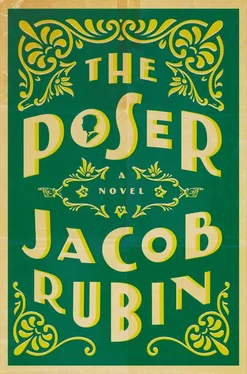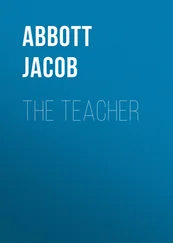“Why deny doing it to the patient’s family then?”
“I asked him that exactly. ‘They wouldn’t understand,’ he said, and their misunderstanding would ruin his reputation. Prevent him from helping the patients who depended on him so.”
“Did you believe him?”
“No. I was beginning to understand that he was a dangerous narcissist, a master of justification. I hated him and resented my mother for allowing him to run wild. He once asked me to simulate choking him.”
“Choking him?”
“‘An oedipal pantomime’ is what he called it. Part of his New Method. But I began to actually choke him.”
“And what happened?”
“I stopped myself, of course. When I did, he began coughing and rubbing his neck, and I was terrified I’d actually hurt him. ‘Good job,’ he said when he’d caught his breath. ‘Excellent!’”
• • •
It happened with the doctor’s embrace that first session. Like an athlete returned from a long injury, I rediscovered the genius of my limbs, and in the weeks that followed I became, both in and outside of his office — on the benches of the lawn and in my room alone — a second, better Orphels.
An impersonation hadn’t fixed me this way since Bernard. I quit my need for cigarettes. Memory of the gun no longer weighed on my hip. When I thought of Fantasma Falls, I felt, if anything, empathy for the people in it — for Nathan, all the Julie Darks, even for Bernard. Toward my fellow patients and the conscientious nurses, for the very birds and bees I brimmed with this same empathy: empathy, which is the surest sign of remove. I was so improved, in fact, it didn’t rattle me in the least when word began to spread, and patients began to recognize, through the veil of my beard, the face of Harry Knott. How did I end up here? I was asked by a stooped patient with sunken eyes. In Orphels’s voice, I told the truth: “I almost killed a man.”
Above all I listened greedily. The doctor, I discovered, had fashioned himself into a kind of key, a key of person, unlocking the men and women of the world. On the cushioned perch of a bay window, at tables in the mess hall, I began to conduct impromptu sessions. Underneath an oak tree. In a back carrel of the library, strangers confessed to me. It had to do with my eyes, my smile. A man who couldn’t stop chewing his nails told me about the niece he had, in the depths of addiction, prostituted. A curly-haired patient with abstracted blue eyes admitted that he may have killed a man — caught a bum mugging a woman, struck him with a lead pipe, right there on the street, then ran away.
Ideas were striking. A new act. I’d call Max after my release, imminent, I knew, given my rapid convalescence. We’d resurrect our old stage show, with a twist: I would now be Doctor Giovanni Bernini (Max could make up some bunk about a European medical degree). Each volunteer would come onstage and lie on a chaise, and I, Doctor Giovanni Bernini, regal in my chair, would tease out each one’s story until the audience — all of us together — had experienced that lurid, healing joy: the airing of another’s secrets. “An Experimental Evening with Doctor Giovanni Bernini,” we’d call it, or “You, with Doctor Bernini.” The first volunteer might be hard to come by, but after that, who wouldn’t want their story confirmed before an attentive audience? It was what all of it had been pushing toward: the insides of another person.
Of course, the interior I was most attentive to in those weeks was that of Doctor Orphels. That he hadn’t yet noticed my stolen speech or upright posture I considered a miracle. I was terrified he’d picked up on it that day he accused me of projection, but there had been no mention of it since. Every day he revealed his innermost experience without the slightest hesitation. No pausing or stuttering, no pocket-digging or side-glancing. The good doctor looked me right in the eyes and confessed, divulging his life story in a voice as airy as his office. There were no walls inside the man. Every question I asked he answered, and in this thoroughgoing manner, like a homeowner showing a burglar around his house, Doctor Orphels opened all the drawers of a forty-year life, handed me his secrets. Like a man confessing directly to a spy.
“All my life it had been my father’s plan for me to enroll at City University for premedical studies,” the doctor began one afternoon. “And when the time came, I did explicitly that. My parents paid for a studio apartment in midtown with the expectation that I would commit myself to class work. A sensible enough plan, except I was completely unable to focus. Let me say, I have an outspoken unconscious mind. I am thankful for it. For some it’s all but disabled: a person might be speeding toward a doomed marriage, an entrapping career, but their unconscious — whether through dreams or sickness or any of its usual emissaries — will keep mum. Mine, however, is, well — let’s say, forthright. So it was at school. It — my unconscious, I mean — wouldn’t let me focus. For the first time in my life I suffered anxiety attacks, couldn’t sleep at all. Soon I stopped attending class altogether. It wasn’t so much a decision as a pattern that developed. I didn’t tell my parents, of course. On the nights I came home for dinner, I told them school was splendid, though I hadn’t been in weeks.”
“How did you occupy yourself?” I asked.
“Worrying, as you may know, is a wonderful hobby. It occupied me quite a bit until I discovered something even better. City University is situated in midtown, near the Handelmen Towers, an area flooded with bankers and stock traders. It wasn’t long before I befriended some of these people at lunch counters, neighborhood bars. Understand, the world of finance had never interested me. Jews, they say, are divided into two strains: the mercantile and the Talmudic, and I fell comfortably into this latter category. Money was important, certainly, but only as a means to a greater pursuit: of medicine, for instance, the mind, God. These brokers and bankers were the first men I’d met who had devoted their lives to money as an end unto itself . Every day they herded into the revolving doors of those midtown skyscrapers, those temples to money — disappeared for ten hours — then came pouring out, each with their slight variation on the same uniform: the fedoras, Italian suits, Swiss watches. Like vestments. The first ones I met were soft-spoken, especially when money itself came up. Real dollar amounts. They had nicknames and code words for it, as if saying the name would be blasphemous. I don’t mean this sarcastically: Money for them was a religious object. I started in the mailroom.”
“All while telling your parents you were enrolled at school?”
“Yes. As it happened, I found I had a talent for the financial life, the sangfroid for it — that might be the word. In four years, I became a full-fledged trader of stocks. In seven, I had bought a large penthouse apartment uptown.”
“Seduced by the high life?”
“Not at all. I’ve never succeeded in becoming a materialist. I know very well the limits of such consolation. Some of my colleagues may have believed they worked to furnish a certain lifestyle — a word I have never found much use for — to buy their wives diamonds, for instance, or to take lavish trips to Rome, but it’s not true. You know what money gives us? Why people worship it?” He smiled. “It’s a freedom from reasons. Money is the most efficient way to rid your life of reasons. No one ever questions why you want money. Doing something for the money can never be the wrong reason to do it. I wanted to eradicate the whole chorus of reason from my life, that life of my father. In this effort, money was a perfect aid.”
Читать дальше












